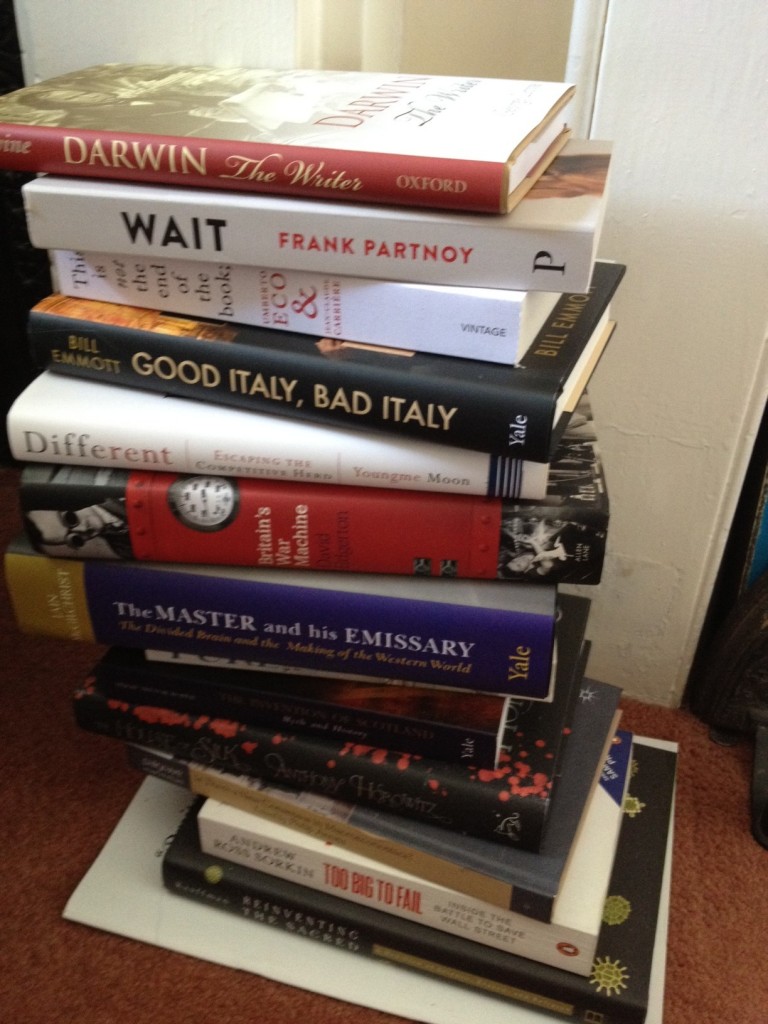As I started to write this post, I looked up the URL for a review by Giles Fraser (the former Canon of St Paul’s Cathedral who departed that job over the Occupy issue) of Michael Sandel’s [amazon_link id=”184614471X” target=”_blank” ]What Money Can’t Buy[/amazon_link] and [amazon_link id=”1590515072″ target=”_blank” ]How Much is Enough?[/amazon_link] by Robert and Edward Skidelsky. The Observer’s website promptly served me with an ad for insights into growth markets in the global economy from Goldman Sachs. There’s hardly any need to say more.
I’ve read Michael Sandel’s book, and reviewed it for The Independent, and debated it with him on Start The Week, so won’t repeat myself. I haven’t read the Skidelskys’ book yet, although I can’t resist wondering whether they have read yet my own [amazon_link id=”0691156298″ target=”_blank” ]The Economics of Enough[/amazon_link] from last year. The review concludes that the Sandel and Skidelsky books are worth reading together and: “form a part of a much broader picture about the multiple failures of free-market fundamentalism and the moral vacuum in which it has trapped us.”
If I may indulge again in praise of [amazon_link id=”1444703951″ target=”_blank” ]Spitalfields Life[/amazon_link], the book has a moving essay called ‘At Stephen Walters & Sons Ltd, Silk Weavers. This business, now in Suffolk but founded in Spitalfields in 1720, is run by a ninth generation silk weaver in the Walters family. The present Mr Walters says:
“With eight generations behind you, it changes the way you approach your life. It’s not just about this year, it’s about managing the company from one generation to the next, so you deal with your employees and your customers differently.”

Master Weaver Joseph Walters
We all have eight generations behind us, and, we hope, ahead of us. The issue is weaving an awareness of our responsibilities to past and future into the institutions and organisations we participate in.
Niall Ferguson, as a conservative historian, is on the same point in his first BBC Reith Lecture, summarised here. He refers to Edmund Burke, who wrote in his [amazon_link id=”0199539022″ target=”_blank” ]Reflections on the Revolution in France[/amazon_link]:
“Society is indeed a contract. ….. It is a partnership in all science; a partnership in all art; a partnership in every virtue, and in all perfection. As the ends of such a partnership cannot be obtained in many generations, it becomes a partnership not only between those who are living, but between those who are living, those who are dead, and those who are to be born.”
As the Greeks file into their polling stations today to vote for chaos, I think the broader picture Giles Fraser speaks of is now widely accepted and it’s time to move into a discussion about what to do.
[amazon_image id=”1590515072″ link=”true” target=”_blank” size=”medium” ]How Much Is Enough?: Money and the Good Life[/amazon_image]




